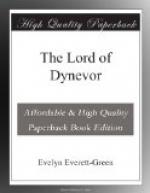He paused and stopped short, and Wendot answered, not without pride:
“I truly am a Welshman — it is my boast to call myself that. If you fear to give your daughter to one of that despised race, so be it. I would not drag her down to degradation; I love her too well for that. Keep her to thyself. I give thee back thy pledge.”
Lord Montacute smiled as he laid his hand upon the young man’s shoulder.
“So hot and hasty, Wendot, as hasty as those black-haired twins. Yet, boy, I like thee for thy outspoken candour, and I would not have thee change it for the smooth treachery of courtly intrigue. If I had nought else to think of, I would plight my daughter’s hand to thee, an ye both were willing, more gladly than to any man I know. But, Wendot, she is mine only child, and very dear to me. There are others who would fain win her smiles, others who would be proud to do her lightest behest. She is yet but a child. Perchance she has not seriously considered these matters. Still there will come a time when she will do so, and —”
“Then let her choose where she will,” cried Wendot, proudly and hotly. “Think you I would wed one whose heart was given elsewhere? Take back your pledge — think of it no more. If the day comes when I may come to her free and unfettered, and see if she has any regard for me, good. I will come. But so long as you hold that peril menaces my path, I will not ask her even to think of me. Let her forget. I will not bind her by a word. It shall be as if those words had never passed betwixt us.”
Lord Montacute scarce knew if regret, relief, or admiration were the feeling uppermost in his mind, as the youth he believed so worthy of his fair daughter, and perhaps not entirely indifferent to her dawning charms, thus frankly withdrew his claim upon her hand. It seems strange to us that any one should be talking and thinking so seriously of matrimony when the girl was but fourteen and the youth three years her senior; but in those days marriages were not only planned but consummated at an absurdly early age according to our modern notions, and brides of fifteen and sixteen were considered almost mature. Many young men of Wendot’s age would be seriously seeking a wife, and although no such thought had entered his head until he had seen Gertrude again, it cannot be denied that the idea had taken some hold upon him now, or that he did not feel a qualm of pain and sorrow at thus yielding up one bright hope just when the task he had taken upon himself seemed to be clouding his life with anxiety and peril.
“Boy,” said Lord Montacute, “I cannot forget what thou hast done nor what she owes to thee. I love thee well, and would fain welcome thee as a son; but my love for her bids me wait till we see what is the result of this office thou hast taken on thyself. Thou hast acted rightly and nobly, but in this world trouble often seems to follow the steps of those who strive most after the right. If thine own life, thine own possessions, are to pay the forfeit if thy brethren fall away into rebellion — and Edward, though a just man and kind, can be stern to exact the uttermost penalty when he is angered or defied — then standest thou in sore peril, peril from which I would shield my maid. Wherefore —”




